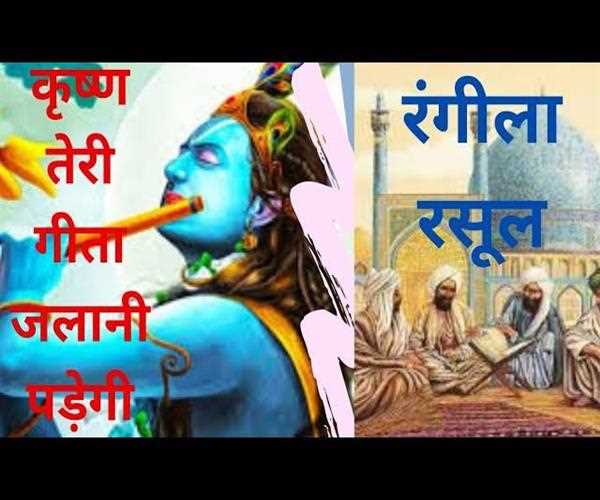
22-Jun-2022 , Updated on 6/27/2022 12:00:46 AM
Rangeela Rasool Controversy and Gandhi's Role
By far, every book a child has read until his adulthood glorifies Gandhiji to be hailed as 'Father of the Nation,' 'Mahatma,' but the irony of this story is that the person who imparted the lessons of non-violence, Satyagraha and Ahimsa, his entire life became the very reason why there was a need to spread these basic principles of humanity to the nation which earlier held diversity with peace, pride, and love.
This story began in the year 1920 with the simple event of distribution of two books to all the mosques in India at that time named 'Krishna Teri Geeta Jalani Padegi,' and the second book was titled 'Nineteenth-Century Lustful Maharishi.' Further, both these books were written by the author 'anonymous.' Furthermore, Both of these books contained extremely abusive things, vulgar texts were written on Lord Shri Krishna, Hinduism, obscene sketches of various deities, etc.
When this matter had reached Gandhi Ji, he vaguely ignored the disrespect and hurt that was felt by the Hindu community and approved it by saying that every citizen had 'freedom of Speech '' in India. The lack of action and the missing aggressive patriotism that was felt by the Hindu community was missing in its leaders, which resulted in this community deciding to take matters into their own hands. They retaliated by publishing two books with titles 'Shaitan'' and 'Rangeela Rasool'' through a Public Printing press in Lahore of Mahashay Rajpal called 'Rajpal Publishers.' in 1923. The author described himself as 'Doodh ka doodh, paani ka paani,' which can be roughly translated as tit for tat. The real author of these two books was Pandit Chamupati (Krishan Prashaad Prataab), who was a well-known scholar of the Koran and Islam.
Rangeela Rasool exposed the details of the personal life of Mohammad, including marriage and his sex life, as it has been expressed in the Koran, which tells a surface appearance of a lyrical and laudatory work on Muhammad and his teachings in it. In fact, this book was originally written in Urdu that had to be translated into Hindi, which was banned in India, Pakistan, and Bangladesh. It was sold in India for a duration of one and a half years. In May 1924, an unexpected justification was issued by Gandhiji in his newspaper column 'Young India,' strongly condemning Rangeela Rasool, saying,' An ordinary and petty publisher in order to earn a few more bucks has insulted Prophet Mohammad and Muslims should punish those who write such books themselves!' implying tacit approval of 'Hinsa' by Muslims towards Hindus. It is funny how political leaders ignore the intensity of the power of influence they hold and the sentiments of the masses that follow and believe in them. This article written by Gandhiji initiated excitement over the Rangila Rasul case, which had by now traveled far from what it had been initially. His action clearly indicated that he never called the Muslims to account even when they have been guilty of gross crimes against Hindus; instead, it seemed as if he was encouraging them in the crimes they did.
This article by Gandhiji was the only encouragement Muslims needed for going on a spree of murderous outrages and massacres in the nation. Consequently, Mahashay Rajpal was attacked many times by Muslims, and not surprisingly, not even one spoken or written word from Gandhiji throughout the years of the attacks on Mahashay Rajpal in his Muslim appeasement newspaper 'Young India.'One of Gandhi's favorites, the Khilafat movement's Maulana Mohammad Ali, instigated and announced from Jama Masjid that 'Kaafir Rajpal should not be spared! He should be punished!' but all this failed to open Gandhiji's eyes towards reality. Moreover, Gandhiji's excessive efforts to defend and appease the Muslim community were quite clear. In addition, some Muslim scholars even filed a report against the book 'Rangeela Rasool' in the Lahore High Court.
Next, Gandhiji published in Aug 1924 that 'When a person does not get justice from Courts, he should try himself to become the judge.' indirectly prompting them to take the law into their own hands. After that, there were assaults on Mr. Rajpal Ji in which a young man named Mohammed Ilm Din made several attacks and ended up killing him. After this murder, Gandhi was in Lahore for around seven days, but he never went to Mahashay Rajpal's family to condone his death. Neither did he ever write anything about this. The hypocrisy is reflected clearly and how much Gandhiji wanted the Muslim support by his side that he went for it so far that he then wrote a letter to the British Viceroy requesting him to forgive Mohammad Ilm Din and not to give him the death sentence. In addition, he wrote one more article in 'Young India,' stating that Mohammad Ilm Din was an innocent, poor carpenter, young, immature, who was religiously angered by the book and thus subconsciously led him to commit the act of murder.
Threatened by the fury of the Hindu community, which never existed for Gandhiji, the British did not consider Gandhi's letter and executed Mohammad Ilm Din in Lahore Jail on 31st October 1929. He further wrote in 'Young India' that it was a 'black day' of history two days after his execution.
Mohammad Ilm Din was glorified and awarded the title 'Hazrat Ghazi' (Honourable Slayer of Infidels/Protector of Islam) and 'Shaheed (Islamic Martyr) 'by Muslims, and around 600,000 people attended his funeral. A film was made in 1978 idolizing him and villainizing Mhashay Rajpal, which should have been the other way around, given the situation.
As educated Indians, we must process and act in situations like these rather than blindly following leaders who instigate the masses towards committing heinous crimes. Another point we must realize is that India is a democratic country and it is most important for us to select the right leader for ourselves, unlike Gandhi. The problem is not only in the actions of Gandhiji but the lack of devotion and unity of Hindus towards their own community, which is now proving to be the cause of a bigger problem that is the extinction of the Hindu Community.

Student
I look for a mix of short-term projects and long-term goals. My organizational skills allow me to successfully multitask and complete both kinds of projects. Working for you would give me the opportunity to build upon my experience and skills in data handling , content writing, financial researcher and analyst, and Product manager as part of a really inspiring and rewarding environment to work.
Comments
Join Our Newsletter
Subscribe to our newsletter to receive emails about new views posts, releases and updates.
Copyright 2010 - 2026 MindStick Software Pvt. Ltd. All Rights Reserved Privacy Policy | Terms & Conditions | Cookie Policy